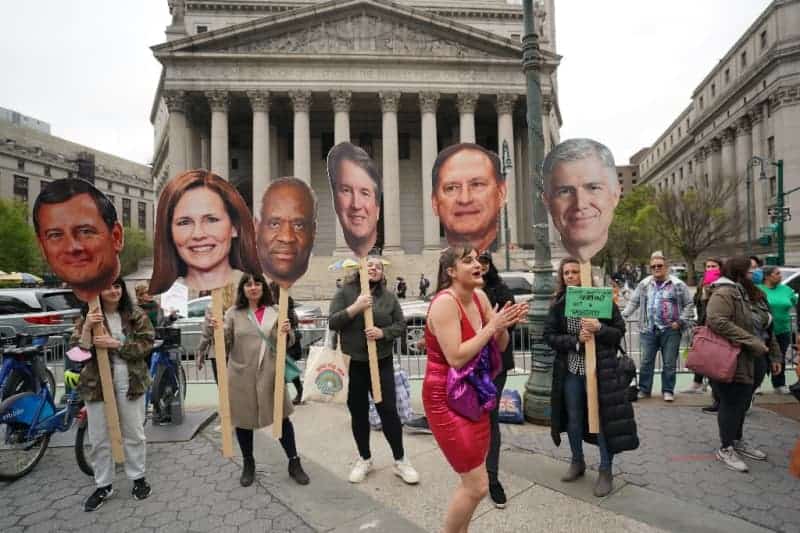AFP

Washington (AFP) – The leaked draft decision that indicates the Supreme Court is poised to eliminate abortion rights marks a stunning triumph of a five-decade campaign by religious conservatives to plant their agenda at the center of US political life.
At the core of the “culture wars” over feminism, race, secularism and LGBTQ rights, the campaign took off when conservative Catholics and Evangelical Protestants joined hands following the landmark 1973 Roe v. Wade ruling guaranteeing a woman's right to have an abortion.
That alliance, at first weak compared to the progressive social movement, grew to become a juggernaut in local and national politics over the following decades.
The final stage was set when Donald Trump, never an opponent of abortion before he ran for president in 2016, repaid the religious right's support by naming three conservative justices to the Supreme Court, tilting it decidedly in their favor.
“Roe v. Wade was decided 50 years ago, and the right wing began to resist it and launched an enormous backlash immediately,” said Columbia Law School Professor Katherine Franke.
Their stunning success at the Supreme Court, she said, represents a “radical retrenchment” of three generations of constitutional law.
Litmus test for candidates
Russell Moore, a veteran Evangelical Christian activist and public theologian at Christianity Today, recalled that abortion was not a partisan political issue in the 1970s.
At the time, he said, “Many Roe supporters assumed that the ‘pro-life' movement would just go away.”
Catholics and Evangelicals built media-savvy lobby groups with names like “Moral Majority” and “Family Research Council” that spread their message in churches around the country.
With strong funding, they supported political candidates who backed “right to life,” as the anti-abortion movement was dubbed, and steadily accrued power.
By the arrival of president Ronald Reagan in 1981, abortion had become a centerpiece of conservative politics, and was a litmus test for any Republican seeking office.
Moore said the movement took advantage of advances in medical technology to promote their arguments.
For one, steady improvements in care for premature babies pushed back the view of “viability” — how early a fetus can live outside the womb — changing people's views of the consequences of abortion.
In addition, Moore said, the spread of sonograms allowed expectant mothers and their families to see their babies in the womb.
With sonograms, “it becomes very difficult… to speak of the unborn child as simply a clump of tissue or collection of cells,” he said.
Washington insider
In parallel with the popular movement, anti-abortion activists built a force in Washington with a long-term goal to get their own justices on the Supreme Court.
“From the very beginning, people understood that this would have to be addressed through the judiciary,” said Moore.
Central to that effort was Leonard Leo, a former clerk of the court's most conservative justice, Clarence Thomas, and a figure in the Catholic Church's anti-abortion Opus Dei sect, a quiet but highly influential force in Washington politics.
From the late 1990s, Leo built a network to shape the US judiciary over the long term, operating from the powerful Federalist Society and tapping donors for tens of millions of dollars.
According to The Washington Post, in the 2000s, Leo was deeply influential in President George W. Bush's administration.
Most notably, Leo led the campaigns to promote Bush's two nominations to the high court: Samuel Alito, the author of the leaked draft opinion overturning Roe, and Chief Justice John Roberts, who reportedly stands with the court's three liberals against it.
A key contact of Leo's in the Bush White House was Brett Kavanaugh — now one of the five Supreme Court Justices who reportedly backed Alito's opinion.
Victory with Trump
Polls showed, and still show, that a significant majority of Americans support abortion rights.
But by 2016, the anti-abortion movement were powerful enough to make or break Trump's presidential campaign.
Never particularly religious or opposed to abortion, Trump actively courted Evangelical leaders and, earning their blessing, began to condemn abortion and say Roe should be overturned.
Trump chose for his vice president Mike Pence, an Evangelical himself who as Indiana governor set tough restrictions on abortion.
And Trump announced a “shortlist” of nominees he would propose to fill court vacancies — a list supplied by Leo.
That helped swing the election, with nearly 80 percent of Evangelicals backing Trump despite clouds over his personal life.
The payoff was clear: Trump, it turned out, had the opportunity to name three justices to the nine-member Supreme Court, and all were conservatives backed by Leo and his network.
Struggle not over
Moore said he is uncomfortable with the way Alito's draft decision was leaked, saying it tarnished the court.
Nevertheless, it marks the success of a five-decade political battle.
“Most conservative evangelicals will be very happy with the court decision,” Moore told AFP.
“But most of us understand that does not mean an end to the struggle, but a new phase,” he said, referring to what is already a fight to have abortion made illegal by the legislatures in each of the 50 states.



